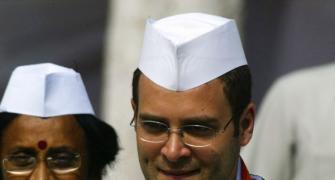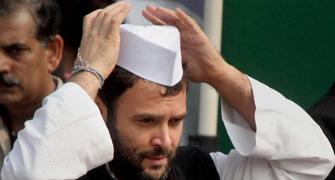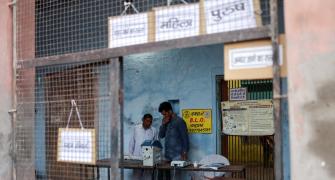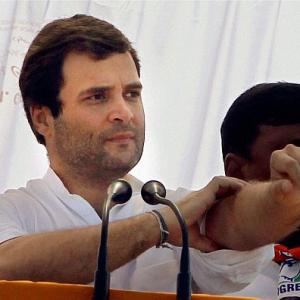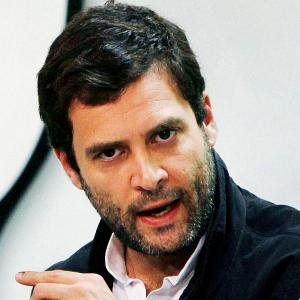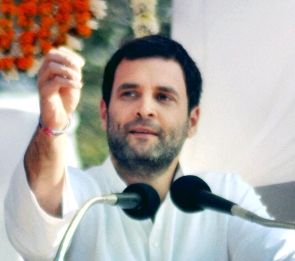 A never-seen-before Rahul Gandhi exuded toughness and aggression. And it was not only about the words he used to castigate the opposition but his dialogue delivery, facial expressions, overall body language that conveyed a different, more confident Gandhi, says Saisuresh Sivaswamy.
A never-seen-before Rahul Gandhi exuded toughness and aggression. And it was not only about the words he used to castigate the opposition but his dialogue delivery, facial expressions, overall body language that conveyed a different, more confident Gandhi, says Saisuresh Sivaswamy.
It was a never-seen-before Rahul Gandhi who addressed the All India Congress Committee session at New Delhi’s Talkatora Stadium on Friday. Slated to address the session at 3.30 pm, even as delegates kept up a steady, intermittent chant to bring him on, the Congress vice president told his party that he will speak to them in the afternoon and clarify a lot of things.
Beginning his speech at a little past 4 pm, Gandhi spoke for around 45 minutes, making it one of his longest speeches. But it was not the length or the English-Hindi-English switch of his speech that made a mark but the never seen before toughness that he exuded. And it was not only about the words he used to castigate the opposition but his dialogue delivery, facial expressions, overall body language that conveyed a different, more confident Gandhi.
And minutes after he exhorted Prime Minister Manmohan Singh to raise the cap on the number of free cooking gas cylinders from the existing nine to 12, the government complied.
So is Rahul Gandhi finally ready to take the electoral bull by its horns? The jury maybe out on that, but these are the five important takeaways we could glean from his sometimes-prepared, sometimes extempore speech.
50 per cent of Congress chief ministers to be women
For a party that has been struggling to pass the bill reserving 33 percent of seats in legislatures for women, this should not be tough at all. The Congress currently has 13 chief ministers, but if you can count out Andhra Pradesh’s Kiran Kumar Reddy from the list there are 12 states in its kitty: Arunachal Pradesh; Assam; Haryana; Himachal Pradesh; Karnataka; Kerala; Maharashtra; Manipur; Meghalaya; Mizoram; Pondicherry; Uttarakhand. Did Rahul Gandhi mean that six of these states will get a new CM? Let’s wait and see.
Crowd-sourcing the manifesto
As Gandhi told the AICC delegates, hitherto the Congress manifesto was drawn up by four people, and the rest of the party workers and officials had no say in what went into it. But not anymore, if Gandhi’s word is kept (and there is no reason why it won’t be). “We will throw open the process of manifesto preparation to you, we will ask everyone for inputs,” he said. “We will take the views of Dalits, tribals, workers, industrialists, youth, women and NGOs” for drafting the manifesto, he told the delegates, to thunderous applause.
Great words, though we wonder how much of the inputs would make it to the final document. Nevertheless, despite our scepticism, we are all for the process of wide consultations in preparing such an important vision and policy document.
Workers to decide candidates in 15 constituencies
It is not just the process of preparing the manifesto that is restricted to a privileged few, the process of selection of candidates is also an esoteric one (why blame the Congress party alone here, though!). Most times the workers are foisted someone not of their choice, at times even someone who does not belong to the constituency, and the workers are expected to throw their heart into the campaign even if they knew the non-winnability factor ahead. Gandhi on Friday promised the AICC that a pilot project will be undertaken in 15 Lok Sabha constituencies for the coming election (he did not specify which these 15 seats were) where the candidate will be decided on the basis of inputs/feedback from the party workers. “We will ask the block presidents, workers, district president to directly select the candidates,” he told the AICC session. And the experiment will be slowly extended to other elections and more seats seeing how it works.
Still short of the American style primaries, we must admit this process of selection is a huge improvement on the present system of arbitrary selection.
No ticket for party-hoppers
Tied to the previous point, Gandhi told the AICC that the party belonged to the worker who gave it his all. “You are the party, and from hereon only party workers will get tickets to fight elections,” he said. What he left unsaid, but nevertheless came across clear and loud, was that those who join the party on the eve of elections for various reasons (another party did not nominate them, being the most common) will not be given Congress tickets -- never mind their winnability. In other words, give us your blood, sweat and tears before you get a Congress ticket.
But lest this be read as a sign that the party’s doors were shut for everyone, Gandhi clarified that the Congress was always open to new members, youths and new ideas. Possibly even to party-hoppers, but not ticket-hopers.
Going full tilt at corruption
Congressmen usually are defensive when it comes to corruption, and not without reason. Not Gandhi, however. At the AICC session he extolled the party’s anti-corruption credentials and told the workers that it was not the Congress but the opposition that was stalling the six crucial anti-corruption legislations that were stuck in Parliament. After all, “we gave the country the Lokpal,” he reminded the party. Gandhi’s message to them: Have these six bills passed in the next three months, put your full strength behind the bills even though the opposition will try its best to stall the passage of these bills.
What are the pending six bills that Gandhi feels will burnish his party’s anti-corruption image? They are: the prevention of corruption (amendment) bill, 2013; the prevention of bribery of foreign public officials and public international organisations bill, 2011; the right of citizens for time-bound delivery of goods and services and redressal of their grievance bill, 2011; the public procurement bill, 2011; the judicial standards and accountability bill, 2010; the whistleblowers protection bill, 2011.

